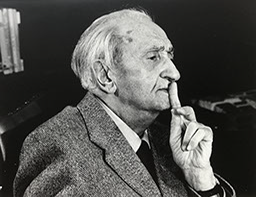
Bridge between human and natural sciences
Leopold Szondi is the explorer of genotropism and the familial unconscious.
The goal of fate analysis is the scientific investigation of the vital plan of the individual, the so-called destiny (schicksal). Since our destiny is derived from a chain of selective acts, naturally the investigation of these selective acts becomes the point of departure of szondien fate analysis. The findings of szondien investigations have led to the discovery of an independent, functional system within the unconscious that directs selective acts.
This component of the unconscious is known as the familial unconscious, because the elements therein that direct the choice are of familial origin. The familial unconscious expresses itself through choice in love, friendship, occupation, disease and death. Investigations of acts of choice by means of genealogies and heredobiology disclose that the genes assume the function of directing these acts of choice.
- Szondi denominated this function genotropism. Originally, Szondi contended that latent recessive genes constitute the familial unconscious. A revised model would include also dominat and the intermediate range of threshold genes. The genotropism is the unconscious functional principle of the familial unconscious.
According to Szondi, individuals with similar genes are gene-relatives without necessarily being kin by genealogy. Genes and their alleles are guaranteeing their survival and evolutionary stabilization by bringing individuals with similar genes together as couples or friends.
Szondi was convinced that gene-relatives cooperate and promote each other, a fact that increases their chance of reproduction.
The theory of genotropism anticipated ideas of sociobiology (Wilson, E. O.; Dawkins, R.) and especially of the genetic similarity theory, proposed by Philippe J. Rushton.
Destiny
Destiny is the hidden vital plan of the individual. According to Szondi this plan comprises six forces.
These are:
- heredity
- drives
- the social milieu
- the mental milieu
- the ego and the spirit.
The integrative and transcendental ego, which is engaged continually and actively in the process of fate’s selection, is the Pontifex oppositorum, the bridge between heredity, drive nature, social and mental milieu, on the one hand, and the spirit, on the other. Consequently, the analysis of choice and the analysis of ego (ego analysis) become the central method of szondien analysis of destiny.
Introduction to the oeuvre of Leopold Szondi
- Richard A. Hughes (1992): Return of the Ancestors. Peter Lang Publishing, Inc., New York; Berlin; Bern; Frankfurt/M; Paris; Wien; ISBN 0-8204-1790-4